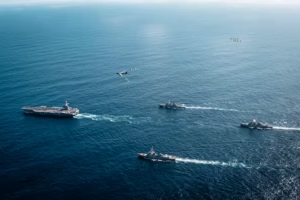Is the World Safer?
Recently, NATO’s chief announced and lauded an “unprecedented” 11% increase in the alliance’s spending. This development, while significant, prompts a deeper reflection on the implications such a surge in military spending holds for global security and peace. The inherent question we need to ask ourselves is whether an increase in NATO spending truly makes the world safer, or is this record defense spending fueling a less secure global environment?
The escalation of military budgets often signifies a heightened state of readiness for conflict, rather than a commitment to peace and stability. This increased spending, while potentially bolstering the defense capabilities of NATO member states, does little to address the root causes of conflict. It perpetuates a cycle where nations respond to security challenges with military solutions rather than diplomatic and developmental initiatives.
The irony is that while defense budgets swell, the funding for diplomacy and international development—tools that are crucial for long-term peace and stability—remains underwhelming. History and research have consistently shown that investments in diplomacy, economic development, and international aid can significantly reduce the likelihood of conflicts. These non-military approaches foster a sense of mutual understanding, cooperation, and respect among nations, contributing to a more secure world.
Consider the potential impacts if even a portion of the increased military spending were redirected towards diplomacy and international development. Such an investment could enhance global efforts to combat poverty, improve education, and address the root causes of instability, such as inequality and unemployment. By focusing on these areas, NATO and its member states could work towards creating conditions that diminish the appeal of extremism and reduce the propensity for conflict.
Moreover, diplomacy and development aid have the power to build bridges between nations, promoting a sense of global community and shared goals. Investing in these areas can lead to more sustainable and inclusive growth, which in turn contributes to a more stable and peaceful international landscape. It’s a strategy that not only addresses the symptoms of global insecurity but tackles its underlying causes.
The current increase in NATO spending reflects a traditional approach to security, rooted in the belief that military might is the primary means of safeguarding nations. However, this perspective overlooks the complex, interconnected nature of modern global challenges. In an era where cyber threats, climate change, and global pandemics transcend national borders, the solutions too must be equally comprehensive and multifaceted.
While bolstering NATO’s military capabilities may offer a sense of short-term security, it is imperative to question the long-term implications of such an approach. A world that is truly secure cannot be achieved through arms and military spending alone. It requires a balanced investment in the tools of peace: diplomacy and development. Redirecting resources towards these ends is not just a moral imperative but a strategic necessity, one that promises a safer, more stable world for future generations.










